[MUSAI] Hidden Contributor of ‘Cyberpunk 2077’ Korean Localization: Script Adaptation (feat. Secrets Behind the Effective Use of Slangs in Games)
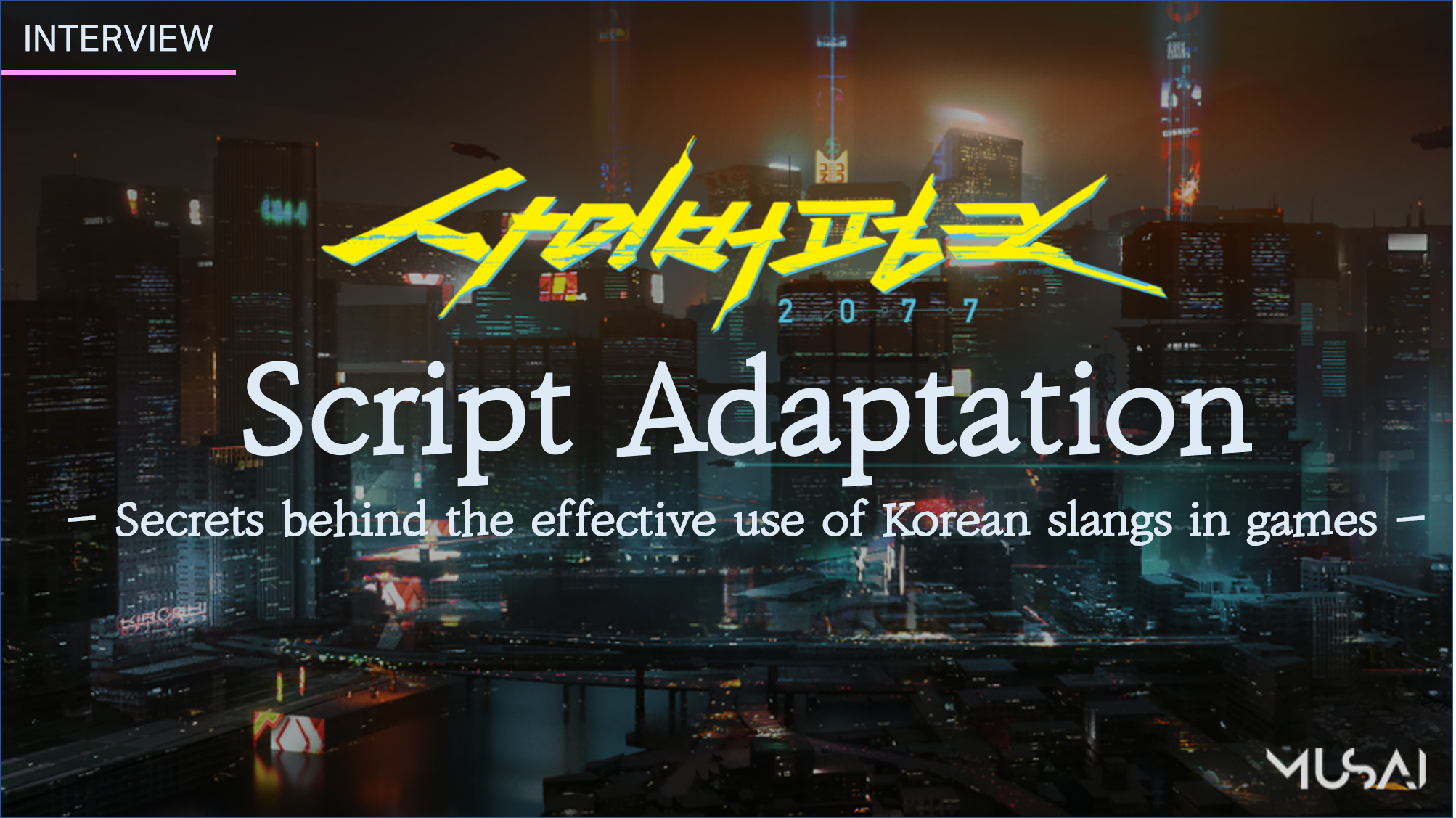
2021-02-26
The Korean dubbing of ‘Cyberpunk 2077’ has struck the gamers heavily; they finally were able to play the game without reading captions, and the level of immersion it presented was something they have not experienced so far. After playing the game with the Korean voice on, the users’ response was hot. And this altered perception of users towards dubbed games is now engaging as a turning point in the perception of those who work in the gaming industry. Therefore, we will start a series on ‘the wind of change blown from the Korean dubbing of Cyberpunk 2077 towards to voice-over on games.’
First, we will talk about the usage of swearing on games. ‘Dubbing of the swear words’ is a common related topic that emerges especially when talking about Korean dubbing of Cyberpunk 2077. As many will know, only based on ‘a solid script,’ profound acting and direction can be built and completed. Through the interview with Yu Jaewoon, the general director of Musai L10n Studio, we will be hearing the secrets behind the script translation, also the story behind dubbing the swear words to carry such an impact, in a voice from the working site.
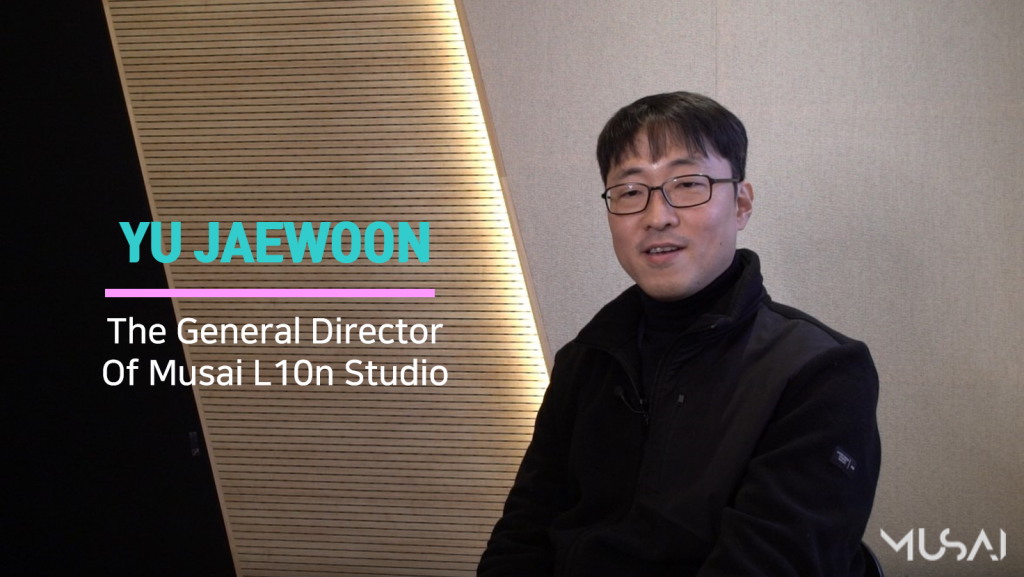
Please introduce yourself.
Hello, I am Yu Jaewoon, the general director of Musai L10n Studio. This is the 15th year since I started working for Musai.
What was your main job in the ‘Cyberpunk 2077’ localization project?
I provided the overall direction in the localization process during the preparation period, reviewed and adapted a part of the script, and managed the overall adaptation process involving many people.
I imagine game translation and dubbing of such tremendous number of texts must have been the first time. Is there any difference between translating lines to be dubbed, and translating texts for subtitles?
Yes, it was the first time translating such large volume of texts for dubbing. It took several months just to adjust the length and revise the already-translated texts to prepare scripts to be recorded. Even after spending so much time, some revisions were made at the recording site. When recording, even if the text lengths were adjusted, the actual length of the recorded voice may differ depending on the actors, and the words or expressions were modified as emotions and acting came into play. Sometimes watching the awesome acting of the voice actors in the recording booth just inspires me, makes me want to make the lines even better.
Are there any specific lines you can think of, which were created like that?
When you select corp V, V and ‘Jenkins,’ V’s superior, talk in this scene in the beginning. In this scene, Jenkins says something like ‘if I do my work, she goes nuts, if I don’t do my work, she goes frantic, that fucking bitch,’ and this Korean dubbed version actually is very different from the original line. When working on this line, I thought about it a lot, because if we follow the original text, it will sound very unnatural. It was something that I would not say, if I were in is shoes. So we decided to change the entire line. The voice actor did a great job with it, as though he has had this kind of experience (laughs). Fortunately, the line came out so great, and users also showed positive response to it.
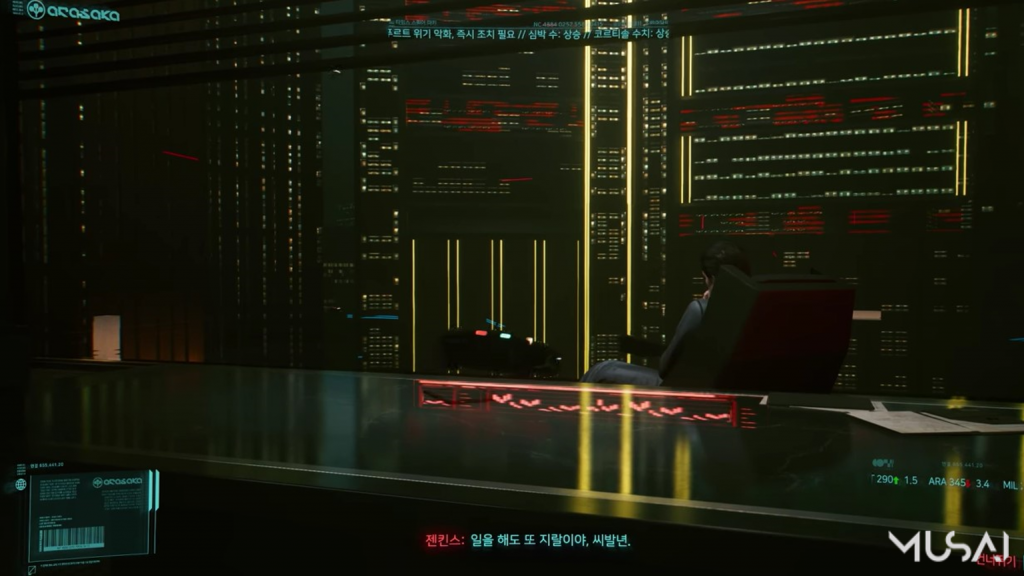
Seems like adaptation process is very important. However, the schedule is usually pretty tight just to do the translation. Is there any specific reason for devoting time and effort on adaptation process in such tight schedule?
Before I joined Musai Studio, I too wondered why there is adaptation process for game scripts. However, after working at the site, I came to realize. There is a huge gap when the translators write the script and actors do their acting. We work on the adaptation process with the functional reasons like modifying pronunciation, adjusting the lengths in order to use the recording time more efficiently, and there are other aspects as well. For example, the weight that lines carry varies depending on emotion and acting. When those generate synergy, it just becomes a whole different thing, and I’ve witnessed such cases a lot. Moreover, an artistic director can bring out all the potential that the actors have much easily, if his/her direction is based on a well-written script. I have experienced myself that one extra step between translation and recording was needed, and this is the reason that I put great emphasis on that step.
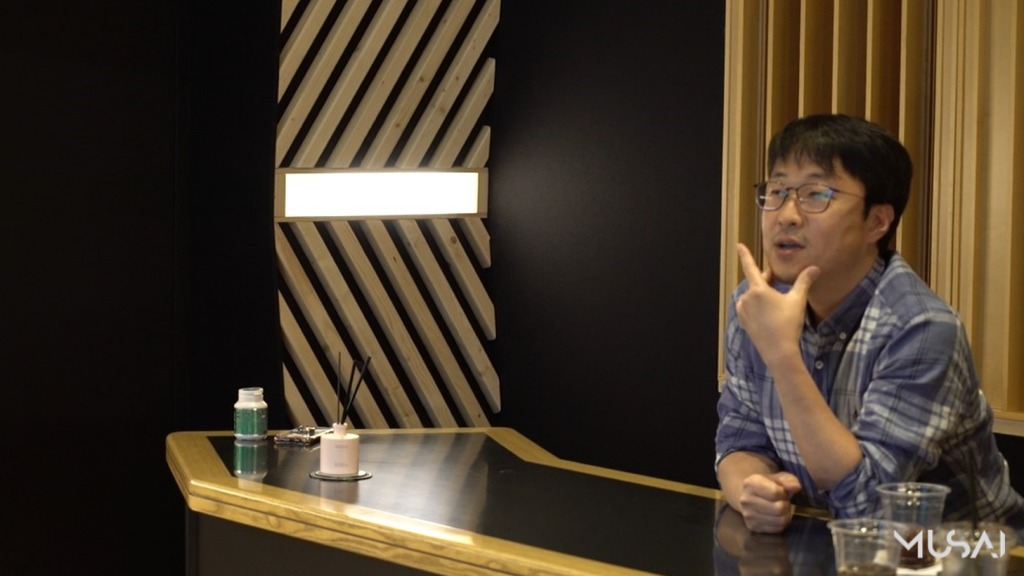
The users’ response to somewhat ‘satisfying’ candid use of slangs and swearing in Cyberpunk 2077 was very enthusiastic. What direction did you provide when proceeding the overall Korean localization?
I lifted the limitations on using profanity. ‘Let’s use it as much as we want!’ (laughs) In terms of directions… Actually, it slightly changed when the game decided to support full dubbing for Korean. When translated scripts are presented as subtitles, the translation must be in sync with the original language rather than variation, otherwise it will feel awkward. Users hear the original text while playing the game, and if they hear different things than what they read, it can really generate confusion. So, when translating the scripts before the full dubbing was announced, we tried to match all the slangs and swearing words to the original scripts. After they decided to do full dubbing for Korean users, we put more emphasis on sounding natural. This was the major component we considered during the adaptation process as well. We can say that the overall direction for localization of ‘Cyberpunk 2077’ did not change, but the methodical aspect on how to make the users really feel the beauty of playing the game in Korean did alter a bit.
How would your rate the Korean localization of Cyberpunk 2077? Would you say it was a success? Any specific points you feel satisfied or regretful?
The most interesting thing was that when the NPCs swear in Korean it really intimidates the users and make them angry. In scenes where NPCs swearing and if it were in captions, users would just be like ‘why is he cursing?’ and just mind their own business. But when those words like “fuck off, you idiot” just pierces through their ears so vividly, anyone would be angry; it has such a huge impact. (laughs)
The thing I feel regrettable is that some words being repeated too many times in some sections, and the fact that we could not revise such points. When recording the script, we did not notice it because the script was not given as a continuous paragraph. For example, we recorded the phrases in order, like A-B-C-D-E, according to the script. But in the actual game, it gets played in order A-C-D-B-E, or even in A-B-E, some scenes being omitted. Sometimes the whole thing varies depending on the players’ choice. As a result, in some sections, same words are repeated too many times.
Is there any specific terms that are often used when a game containing profanity?
You may think it’s surprising, but we prefer using sentences rather than direct words like ‘fuck,’ ‘shit,’ ‘bitch,’ etc. For example, we try to use sentences like ‘who do you think you are (fucking) messing with?’, and like the Jenkins’ line mentioned earlier. When a line comes to mind and if it fits perfectly with the character I imagined, I really feel excited. I’ve watched a lot of movies like ‘Tazza,’ ‘’The Thieves,’ ‘New World,’ etc., which are famous because of its well-written scripts and lines. I got my inspiration form those movies and it had considerably affected me.
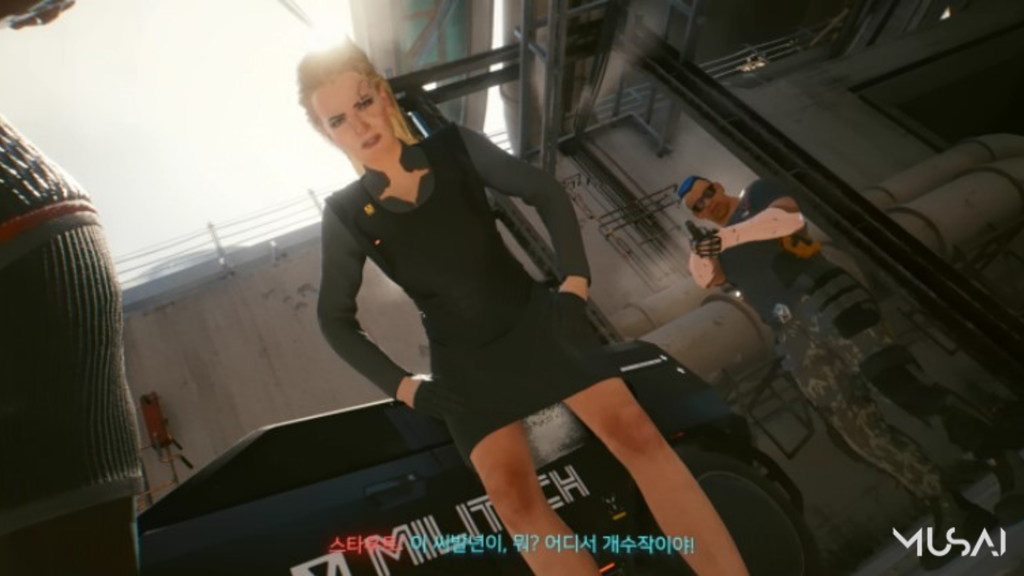
By looking at the previous article about user reaction analysis article on Musai Blog, we can see there are both positive and negative feedback from the users. Why do you think the users are so excited about games containing profanity? Why do you think appropriate use of swearing words may be important for games as a media platform?
The most exciting content of gaming experience is the immersion they can feel when playing; They leave the material world for a moment to enter the world of imagination. It’s not just an indirect experience; you get to actually dive into the world the game provides, by being the character. You can jump into a battle ground, be an assassin, a spy, a gangster, a hero, a villain, just everything you wish to become. But if everyone you see in the world says, ‘damn it,’ or ‘rubbish,’ ‘hell’ all the time, it will seem so awkward. You just need to hear lines that perfectly fits the situation and characters. It’s not just a matter of using lots of swearing words. In my opinion, the degree of satisfaction significantly varies depending on how the slangs or swearing words express the nuance, containing the impact. Moreover, it is fun only when the lines are not awkward when spoken in Korean.
- reference article: “User Response Analysis Article, “More Thank Half (54%_ of Gamers Prefer the Korean Dubbed Version of Cyberpunk 2077” http://blog.musaistudio.com/musai-user-response-analysis-article-more-than-half-54-of-gamers-prefer-the-korean-dubbed-version-of-cyberpunk-2077
On the other hand, many also commented that ‘fuck (sibal)’ appears too many times making it seem rather awkward. But what is being said is that there were much more F-words in the original text, and it had been reduced. Is it true?
Yes, the ‘F-word (sibal)’ does appear a lot. Some incidents occasionally happened during the recording session; the length of the script would not match the original language and would delay the whole process. In these cases, the magic word that can be adjusted into appropriate length while maintaining the meaning, would add the suitable emphasis and blend into the situation so naturally was the f-word. So, we reverted to the easier option several times due to the time-ticking, urgent situations of the recording site, to use the word, and those incidents just accumulated. We totally understand all the complains since we also figured out the word is repeated bit too much in the game. We will be careful to use wide range of words.
The localization of Cyberpunk 2077 has laid a huge impact on the game localization industry. As a game translator, how do you think this project affected the industry? Do you feel any change?
What I was most surprised is that many users commented that ‘the level of immersion’ they could feel ‘playing the game without subtitles was just different, almost like entering a new world.’ Korean gamers are very used to playing games with captions; gamers were accustomed to turn on the subtitles even when playing dubbed games. So, watching the players turning off the captions and being immersed into the game, it felt like ‘it really worked.’ As a person who have been working in the industry for a long time, it was like crossing a huge mountain.
If you have any wishes or personal goals for game localization, including translation of games containing profanity, please share with us.
It would be perfect if more great titles provide the Korean voice-over, giving players options to choose like ‘Cyberpunk 2077.’ Reading subtitles while playing games is just so inconvenient. So much easier to get lost in the middle of the context or literally get lost in middle of nowhere…
We will continue to do our best to fulfill gamers’ expectations and raise the level of satisfaction, with the best-quality translation and brilliant dubbing. Thank you.
** Did you enjoy the news of Musai? Please click subscribe and share the story.
BOOST YOUR PLAY! Musai Studio


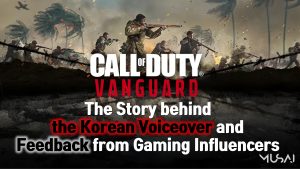

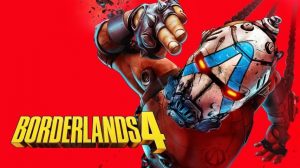



I’ve been learning a little Korean for fun, and I was happy to see Cyberpunk has such a wonderful Korean dub. The language is so rich, the acting is great, and there’s SO MUCH REAL SPOKEN DIALOG in the game. (The language in the game is quite difficult, far above my level, but it’s so good I try anyway.)
Seriously, I don’t even mind the repetition. I will finally learn the correct pronunciation of fuck and stop mixing it up with the word for 18. (씨발 and 십팔)